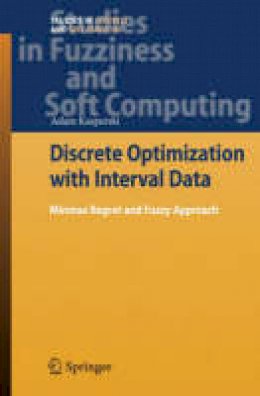
Stock image for illustration purposes only - book cover, edition or condition may vary.
Discrete Optimization with Interval Data: Minmax Regret and Fuzzy Approach (Studies in Fuzziness and Soft Computing)
Adam Kasperski
€ 132.33
FREE Delivery in Ireland
Description for Discrete Optimization with Interval Data: Minmax Regret and Fuzzy Approach (Studies in Fuzziness and Soft Computing)
Hardcover. Practitioners of operations research are often faced with incomplete or uncertain data. Focusing on basic and traditional problems, this book considers solving combinatorial optimization problems with imprecise data modeled by intervals and fuzzy intervals. Series: Studies in Fuzziness and Soft Computing. Num Pages: 220 pages, 17 black & white tables, biography. BIC Classification: PBU. Category: (P) Professional & Vocational. Dimension: 234 x 156 x 14. Weight in Grams: 514.
Operations research often solves deterministic optimization problems based on elegantand conciserepresentationswhereall parametersarepreciselyknown. In the face of uncertainty, probability theory is the traditional tool to be appealed for, and stochastic optimization is actually a signi?cant sub-area in operations research. However, the systematic use of prescribed probability distributions so as to cope with imperfect data is partially unsatisfactory. First, going from a deterministic to a stochastic formulation, a problem may becomeintractable. Agoodexampleiswhengoingfromdeterministictostoch- tic scheduling problems like PERT. From the inception of the PERT method in the 1950's, it was acknowledged that data concerning activity duration times is generally not perfectly known and ... Read more
Operations research often solves deterministic optimization problems based on elegantand conciserepresentationswhereall parametersarepreciselyknown. In the face of uncertainty, probability theory is the traditional tool to be appealed for, and stochastic optimization is actually a signi?cant sub-area in operations research. However, the systematic use of prescribed probability distributions so as to cope with imperfect data is partially unsatisfactory. First, going from a deterministic to a stochastic formulation, a problem may becomeintractable. Agoodexampleiswhengoingfromdeterministictostoch- tic scheduling problems like PERT. From the inception of the PERT method in the 1950's, it was acknowledged that data concerning activity duration times is generally not perfectly known and ... Read more
Product Details
Publisher
Springer
Format
Hardback
Publication date
2008
Series
Studies in Fuzziness and Soft Computing
Condition
New
Number of Pages
220
Place of Publication
Berlin, Germany
ISBN
9783540784838
SKU
V9783540784838
Shipping Time
Usually ships in 15 to 20 working days
Ref
99-15
Reviews for Discrete Optimization with Interval Data: Minmax Regret and Fuzzy Approach (Studies in Fuzziness and Soft Computing)
.png)